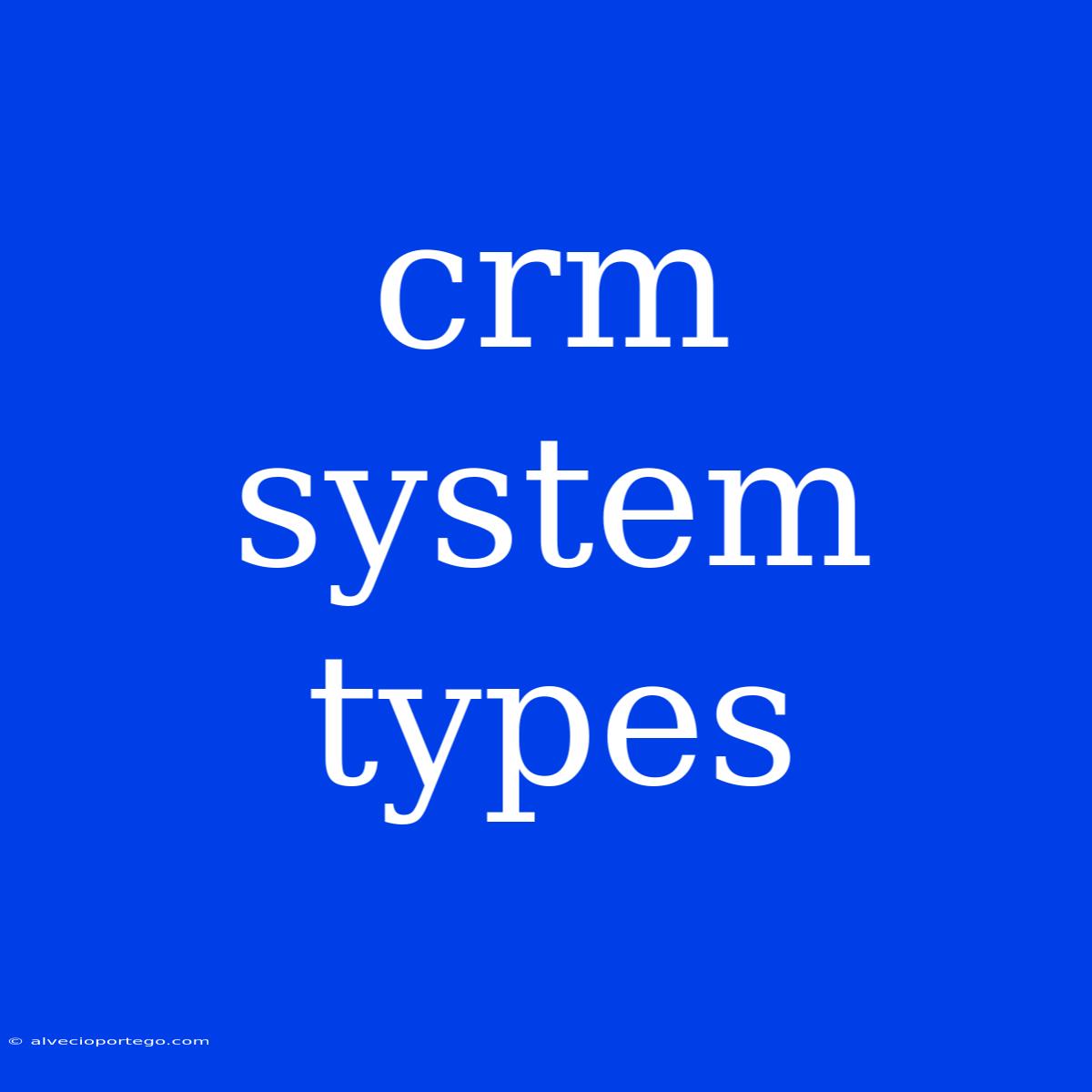CRM System Types: A Guide to Finding the Right Fit for Your Business
Customer relationship management (CRM) systems are essential tools for businesses of all sizes. They help you manage customer interactions, track sales pipelines, and ultimately, boost your bottom line. But with so many CRM systems on the market, how do you choose the right one for your business?
The first step is understanding the different types of CRM systems. Here's a breakdown of the most common categories:
1. On-Premise CRM Systems
What they are: On-premise CRM systems are installed and hosted on your own servers, within your company's physical location. You have complete control over the software, data, and infrastructure.
Pros:
- High security: Data resides on your own servers, offering greater control and security.
- Customization: You have complete flexibility to tailor the system to your specific needs.
- Integration: Easy to integrate with your existing systems.
Cons:
- High upfront costs: Requires significant investment in hardware, software, and IT staff.
- Maintenance: Requires ongoing maintenance and updates.
- Scalability: Can be difficult to scale as your business grows.
Best suited for: Large enterprises with dedicated IT resources and high security requirements.
2. Cloud-Based CRM Systems
What they are: Cloud-based CRM systems are hosted on remote servers and accessed over the internet. Your data is stored in the cloud, and the software provider manages all updates and maintenance.
Pros:
- Cost-effective: Lower upfront costs and predictable monthly subscription fees.
- Scalability: Easily scales up or down as your business needs change.
- Accessibility: Accessible from any device with an internet connection.
Cons:
- Security: Data is stored on third-party servers, raising potential security concerns.
- Limited customization: May have limited customization options compared to on-premise systems.
- Internet dependency: Reliant on a stable internet connection.
Best suited for: Businesses of all sizes, particularly those seeking affordability and flexibility.
3. Operational CRM Systems
What they are: Operational CRM systems focus on automating and streamlining core business processes, such as sales, marketing, and customer service.
Examples:
- Sales force automation (SFA): Automate sales tasks like lead generation, opportunity management, and forecasting.
- Customer service automation: Handle customer inquiries, track support tickets, and manage service levels.
- Marketing automation: Automate marketing campaigns, track email marketing results, and manage social media interactions.
Best suited for: Businesses looking to improve efficiency and productivity in their daily operations.
4. Analytical CRM Systems
What they are: Analytical CRM systems provide insights into customer behavior and preferences, helping you make data-driven decisions. They use data mining and reporting tools to analyze customer data and uncover trends.
Examples:
- Customer segmentation: Divide your customers into different groups based on their demographics, purchase history, and other factors.
- Predictive analytics: Use historical data to predict future customer behavior and identify potential opportunities.
- Marketing analytics: Track the effectiveness of your marketing campaigns and identify areas for improvement.
Best suited for: Businesses seeking to gain a deeper understanding of their customers and optimize their marketing efforts.
5. Collaborative CRM Systems
What they are: Collaborative CRM systems are designed to facilitate communication and collaboration among different departments within a company. They provide a centralized platform for teams to share information, manage tasks, and track progress.
Examples:
- Shared customer database: All departments can access the same customer information, ensuring consistency and preventing duplication.
- Team collaboration tools: Enable teams to work together on projects and manage tasks effectively.
- Social media integration: Connect your CRM with social media platforms to track customer interactions and manage online reputation.
Best suited for: Businesses that need to improve communication and collaboration among departments.
Choosing the Right CRM System for You
The best CRM system for your business depends on a variety of factors, including:
- Business size and industry: Different CRM systems cater to specific business needs and industries.
- Budget: Consider your budget and the cost of implementation, ongoing maintenance, and training.
- Features and functionality: Identify the essential features that meet your business requirements.
- Scalability: Choose a system that can grow with your business.
By carefully evaluating your needs and comparing different CRM options, you can find the best system to help you manage customer relationships and drive business success.

